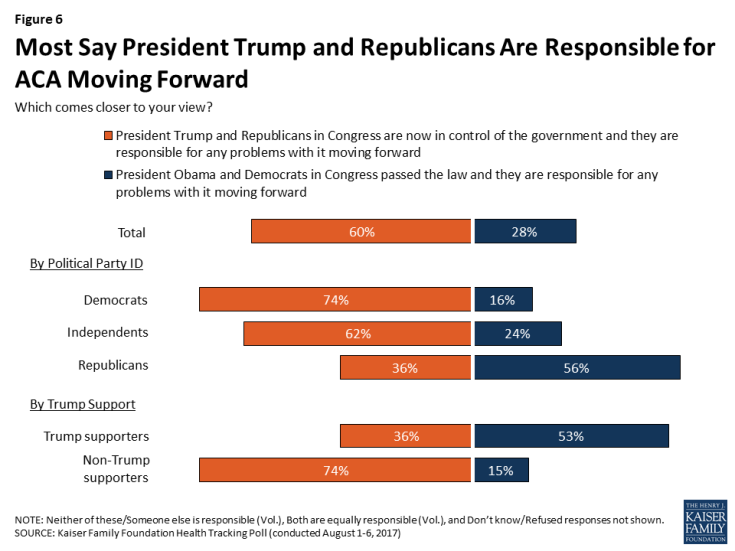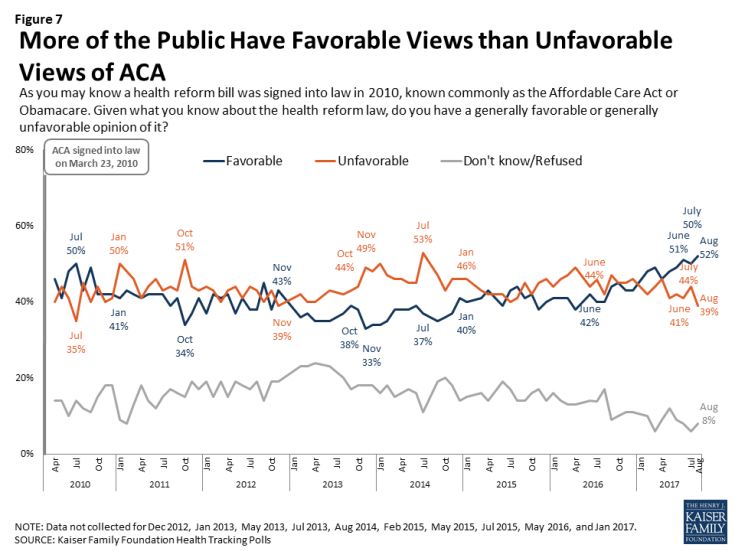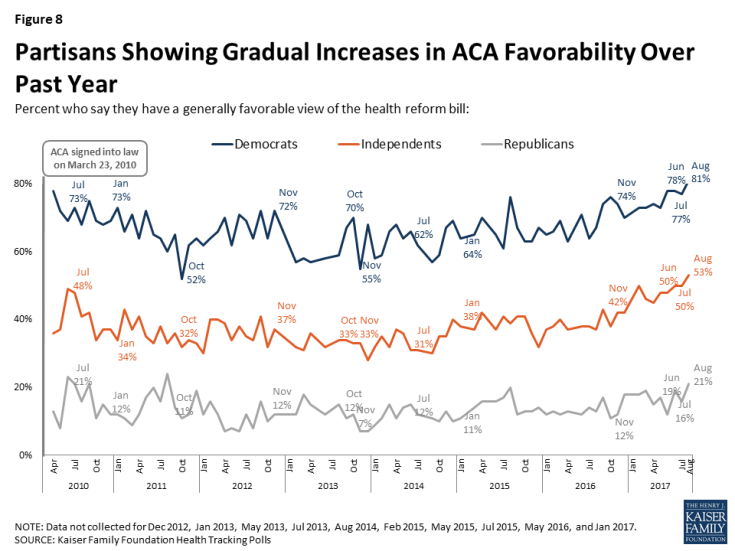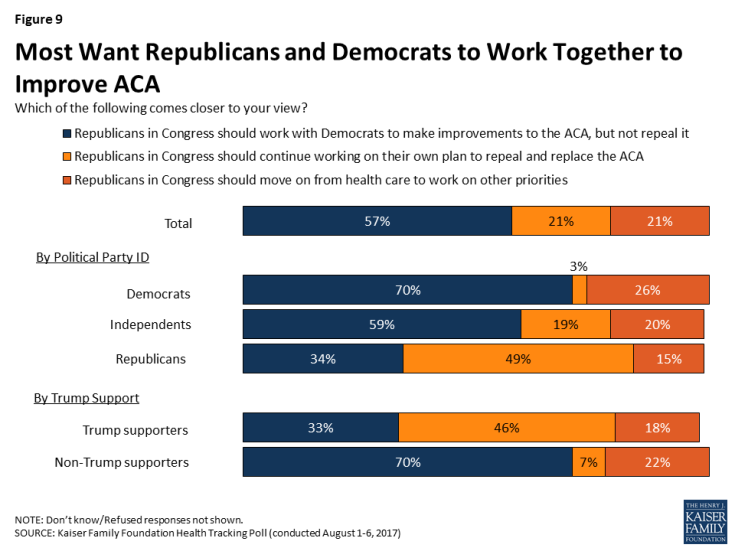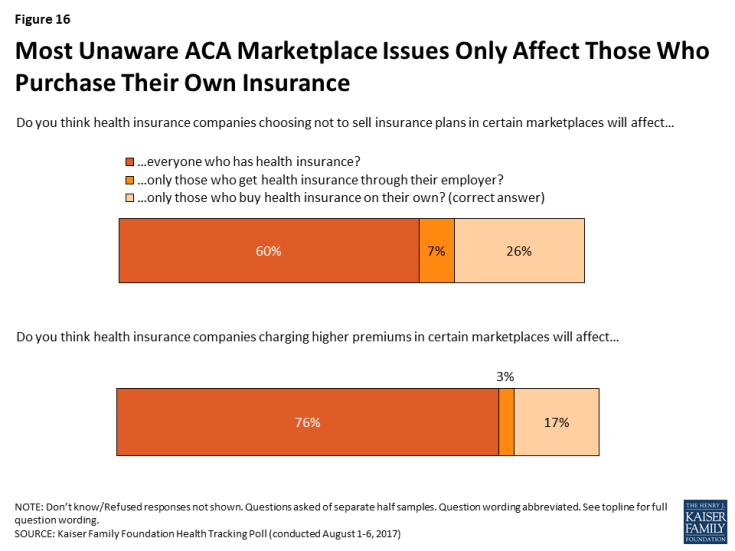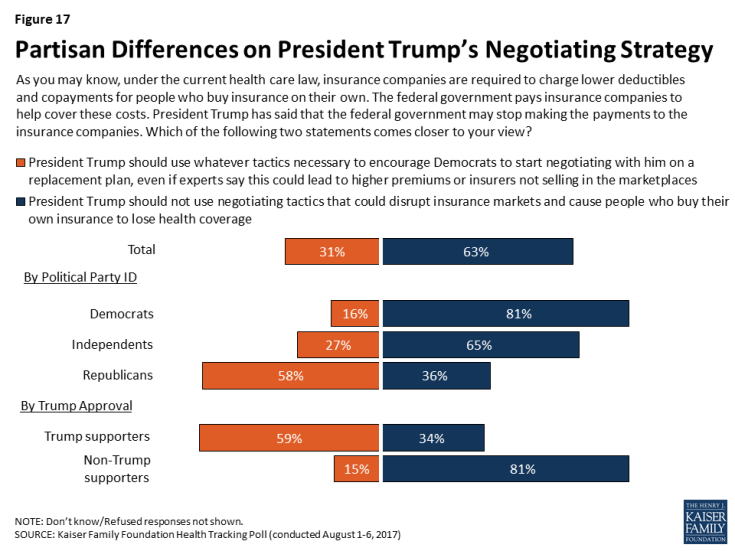Kaiser Health Tracking Poll – August 2017: The Politics of ACA Repeal and Replace Efforts
KEY FINDINGS:
- The August Kaiser Health Tracking Poll finds that the majority of the public (60 percent) say it is a “good thing” that the Senate did not pass the bill that would have repealed and replaced the ACA. Since then, President Trump has suggested Congress not take on other issues, like tax reform, until it passes a replacement plan for the ACA, but six in ten Americans (62 percent) disagree with this approach, while one-third (34 percent) agree with it.
- A majority of the public (57 percent) want to see Republicans in Congress work with Democrats to make improvements to the 2010 health care law, while smaller shares say they want to see Republicans in Congress continue working on their own plan to repeal and replace the ACA (21 percent) or move on from health care to work on other priorities (21 percent). However, about half of Republicans and Trump supporters would like to see Republicans in Congress keep working on a plan to repeal the ACA.
- A large share of Americans (78 percent) think President Trump and his administration should do what they can to make the current health care law work while few (17 percent) say they should do what they can to make the law fail so they can replace it later. About half of Republicans and supporters of President Trump say the Trump administration should do what they can to make the law work (52 percent and 51 percent, respectively) while about four in ten say they should do what they can to make the law fail (40 percent and 39 percent, respectively). Moving forward, a majority of the public (60 percent) says President Trump and Republicans in Congress are responsible for any problems with the ACA.
- Since Congress began debating repeal and replace legislation, there has been news about instability in the ACA marketplaces. The majority of the public are unaware that health insurance companies choosing not to sell insurance plans in certain marketplaces or health insurance companies charging higher premiums in certain marketplaces only affect those who purchase their own insurance on these marketplaces (67 percent and 80 percent, respectively). In fact, the majority of Americans think that health insurance companies charging higher premiums in certain marketplaces will have a negative impact on them and their family, while fewer (31 percent) say it will have no impact.
- A majority of the public disapprove of stopping outreach efforts for the ACA marketplaces so fewer people sign up for insurance (80 percent) and disapprove of the Trump administration no longer enforcing the individual mandate (65 percent). While most Republicans and Trump supporters disapprove of stopping outreach efforts, a majority of Republicans (66 percent) and Trump supporters (65 percent) approve of the Trump administration no longer enforcing the individual mandate.
- The majority of Americans (63 percent) do not think President Trump should use negotiating tactics that could disrupt insurance markets and cause people who buy their own insurance to lose health coverage, while three in ten (31 percent) support using whatever tactics necessary to encourage Democrats to start negotiating on a replacement plan. The majority of Republicans (58 percent) and President Trump supporters (59 percent) support these negotiating tactics while most Democrats, independents, and those who disapprove of President Trump do not (81 percent, 65 percent, 81 percent).
- This month’s survey continues to find that more of the public holds a favorable view of the ACA than an unfavorable one (52 percent vs. 39 percent). This marks an overall increase in favorability of nine percentage points since the 2016 presidential election as well as an increase of favorability among Democrats, independents, and Republicans.
Attitudes Towards Recent “Repeal and Replace” Efforts
In the early morning hours of July 28, 2017, the U.S. Senate voted on their latest version of a plan to repeal and replace the 2010 Affordable Care Act (ACA). Known as “skinny repeal,” this plan was unable to garner majority support– thus temporarily halting Congress’ ACA repeal efforts. The August Kaiser Health Tracking Poll, fielded the week following the failed Senate vote, finds that a majority of the public (60 percent) say it is a “good thing” that the U.S. Senate did not pass a bill aimed at repealing and replacing the ACA, while about one-third (35 percent) say this is a “bad thing.” However, views vary considerably by partisanship with a majority of Democrats (85 percent), independents (62 percent), and individuals who say they disapprove of President Trump (81 percent) saying it is a “good thing” that the Senate did not pass a bill compared to a majority of Republicans (64 percent) and individuals who say they approve of President Trump (65 percent) saying it is a “bad thing” that the Senate did not pass a bill.
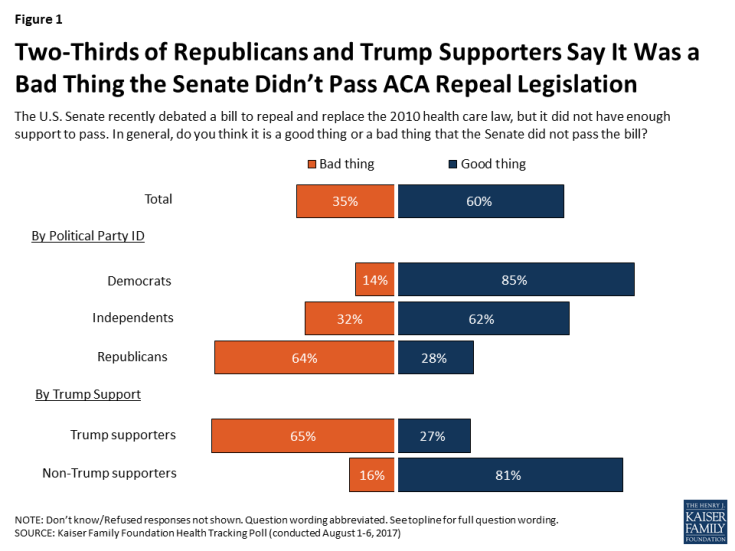
Figure 1: Two-Thirds of Republicans and Trump Supporters Say It Was a Bad Thing the Senate Didn’t Pass ACA Repeal Legislation
The majority of those who view the Senate not passing an ACA replacement bill as a “good thing” say they feel this way because they do not want the 2010 health care law repealed (34 percent of the public overall) while a smaller share (23 percent of the public overall) say they feel this way because, while they support efforts to repeal and replace the ACA, they had specific concerns about the particular bill the Senate was debating.
And while most Republicans and supporters of President Trump say it is a “bad thing” that the Senate did not pass ACA repeal legislation, for those that say it is a “good thing” more Republicans say they had concerns about the Senate’s particular legislation (21 percent) than say they do not want the ACA repealed (6 percent). This is also true among supporters of President Trump (19 percent vs. 6 percent).
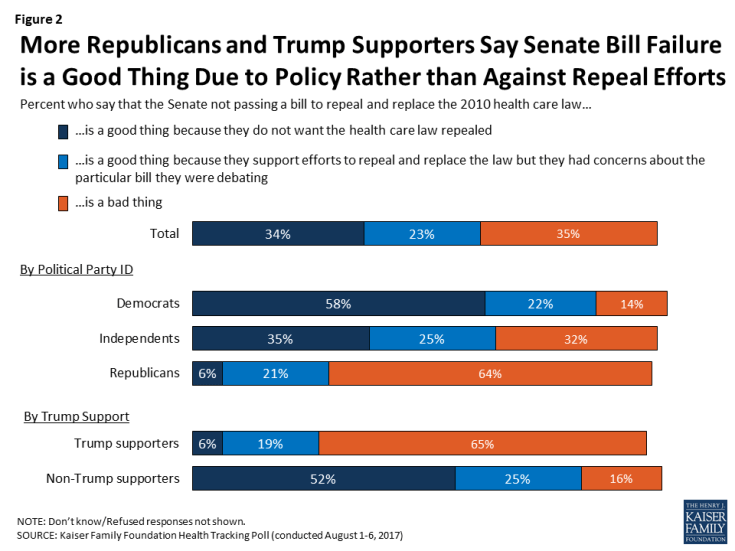
Figure 2: More Republicans and Trump Supporters Say Senate Bill Failure is a Good Thing Due to Policy Rather than Against Repeal Efforts
Who Do People Blame or Credit for the Senate Bill Failing to Pass?
Among those who say it is a “good thing” that the Senate was unable to pass ACA repeal and replace legislation, similar shares say the general public who voiced concerns about the bill (40 percent) and the Republicans in Congress who voted against the bill (35 percent) deserve most of the credit for the bill failing to pass. This is followed by a smaller share (14 percent) who say Democrats in Congress deserve the most credit.
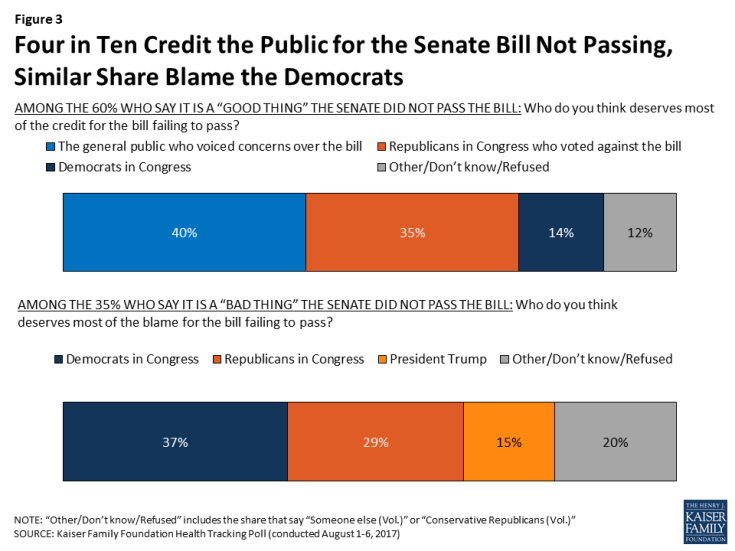
Figure 3: Four in Ten Credit the Public for the Senate Bill Not Passing, Similar Share Blame the Democrats
On the other hand, among those who say it is a “bad thing” that the Senate did not pass a bill to repeal the ACA, over a third place the blame on Democrats in Congress (37 percent). About three in ten (29 percent) place the blame on Republicans in Congress while fewer (15 percent) say President Trump deserves most of the blame for the bill failing to pass.
Half of the Public Are “Relieved” or “Happy” The Senate Did Not Repeal and Replace the ACA
More Americans say they are “relieved” (51 percent) or “happy” (47 percent) that the Senate did not pass a bill repealing and replacing the ACA, than say they are “disappointed” (38 percent) or “angry” (19 percent).
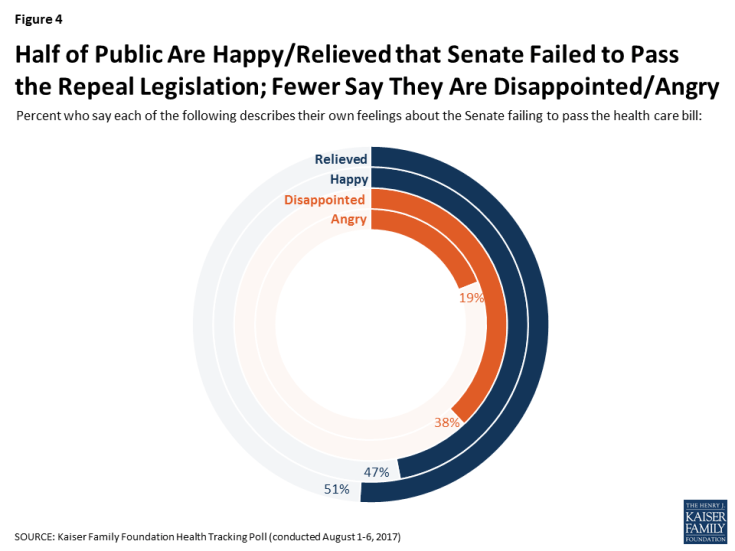
Figure 4: Half of Public Are Happy/Relieved that Senate Failed to Pass the Repeal Legislation; Fewer Say They Are Disappointed/Angry
Although two-thirds of Republicans and Trump supporters say they feel “disappointed” about the Senate failing to pass a bill to repeal and replace the ACA, smaller shares (30 percent and 37 percent, respectively) report feeling “angry” about the failure to pass the health care bill.
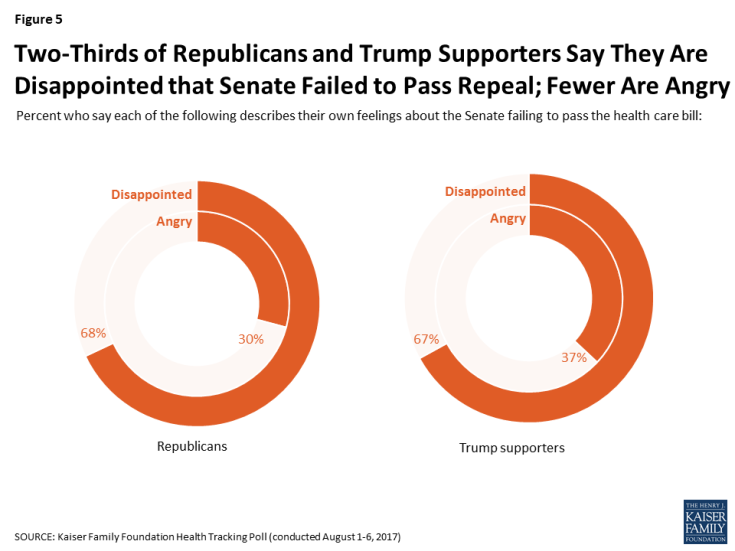
Figure 5: Two-Thirds of Republicans and Trump Supporters Say They Are Disappointed that Senate Failed to Pass Repeal; Fewer Are Angry
Majority Say President Trump and Republicans in Congress Are Responsible for the ACA Moving Forward
With the future of any other replacement plans uncertain, the majority (60 percent) of the public say that because President Trump and Republicans in Congress are now in control of the government, they are responsible for any problems with the ACA moving forward, compared to about three in ten Americans (28 percent) who say that because President Obama and Democrats in Congress passed the law, they are responsible for any problems with it. Partisan divisiveness continues with majorities of Republicans and supporters of President Trump who say President Obama and Democrats are responsible for any problems with it moving forward, while large shares of Democrats, independents, and those who do not approve of President Trump say President Trump and Republicans in Congress are responsible for the law moving forward.
Moving Past Repealing The Affordable Care Act
This month’s survey continues to find that more of the public holds a favorable view of the ACA than an unfavorable one (52 percent vs. 39 percent). This marks an overall increase in favorability since Congress began debating ACA replacement plans and a nine percentage point shift since the 2016 presidential election.
The shift in attitudes since the 2016 presidential election is found regardless of party identification. For example, the share of Republicans who have a favorable view of the ACA has increased from 12 percent in November 2016 to 21 percent in August 2017. This is similar to the increase in favorability among independents (11 percentage points) and Democrats (7 percentage points) over the same time period.
Next Steps For The ACA
The most recent Kaiser Health Tracking Poll finds that after the U.S. Senate was unable to pass a plan to repeal and replace the ACA, the majority of the public (57 percent) wants to see Republicans in Congress work with Democrats to make improvements to the 2010 health care law but not repeal it. Far fewer want to see Republicans in Congress continue working on their own plan to repeal and replace the ACA (21 percent) or move on from health care to work on other priorities (21 percent). About half of Republicans (49 percent) and Trump supporters (46 percent) want Republicans in Congress to continue working on their own plan to repeal and replace the ACA, but about a third of each say they would like to see Republicans work with Democrats on improvements to the ACA.
Six in ten Americans (62 percent) disagree with President Trump’s strategy of Congress not taking on other issues, like tax reform, until it passes a replacement plan for the ACA while one-third (34 percent) of the public agree with this approach. Republicans and Trump supporters are more divided in their opinion on this strategy with similar shares saying they agree and disagree with the approach.
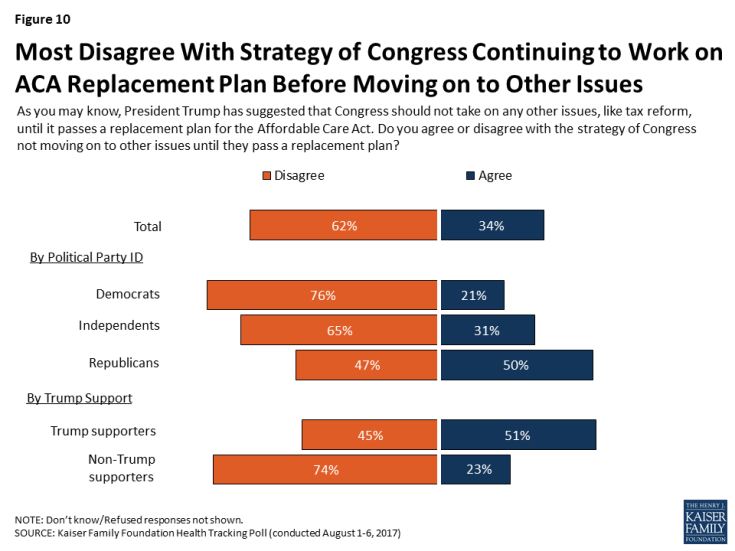
Figure 10: Most Disagree With Strategy of Congress Continuing to Work on ACA Replacement Plan Before Moving on to Other Issues
Most Want to See President Trump and Republicans Make the Current Health Care Law Work
Regardless of their opinions of the ACA, the majority of the public want to see the 2010 health care law work. Eight in ten (78 percent) Americans think President Trump and his administration should do what they can to make the current health care law work while fewer (17 percent) say President Trump and his adminstration should do what they can to make the law fail so they can replace it later. About half of Republicans and supporters of President Trump say the Trump administration should do what they can to make the law work (52 percent and 51 percent, respectively) while about four in ten say they should do what they can to make the law fail (40 percent and 39 percent, respectively).
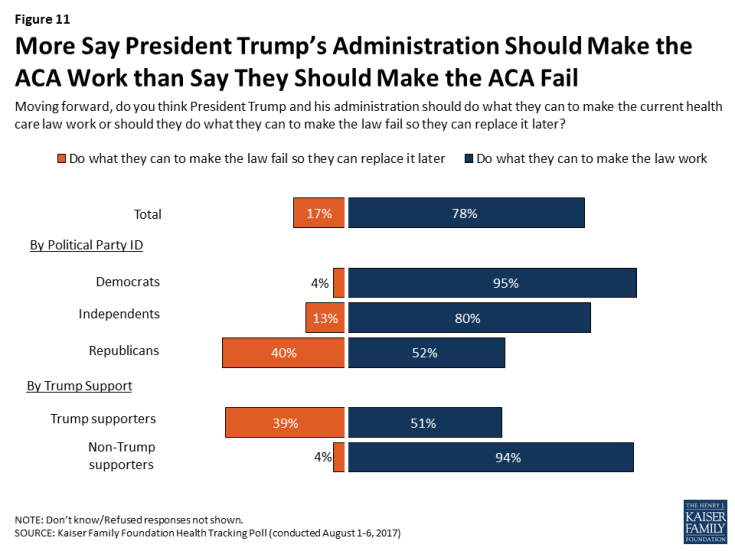
Figure 11: More Say President Trump’s Administration Should Make the ACA Work than Say They Should Make the ACA Fail
This month’s survey also includes questions about specific actions that the Trump administration can take to make the ACA fail and finds that the majority of the public disapproves of the Trump Administration stopping outreach efforts for the ACA marketplaces so fewer people sign up for insurance (80 percent) and no longer enforcing the individual mandate, the requirement that all individuals have insurance or pay a fine (65 percent). While most Republicans and Trump supporters disapprove of President Trump stopping outreach efforts so fewer people sign up for insurance, which experts say could weaken the marketplaces, a majority of Republicans (66 percent) and Trump supporters (65 percent) approve of the Trump administration no longer enforcing the individual mandate.
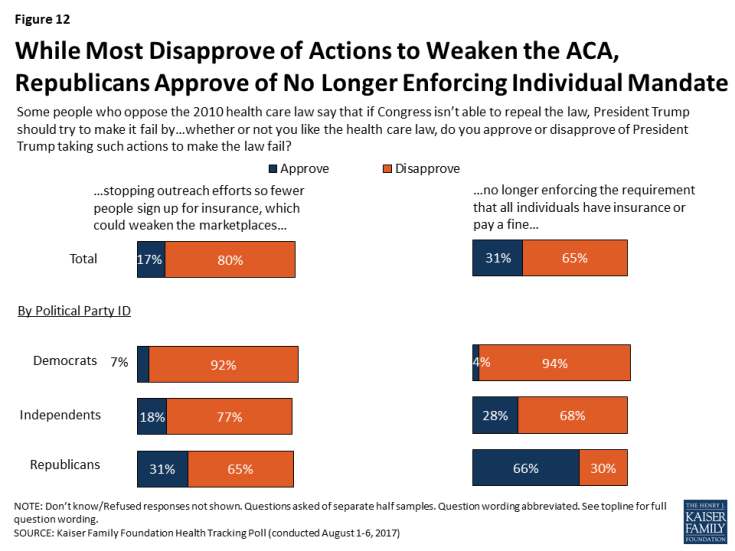
Figure 12: While Most Disapprove of Actions to Weaken the ACA, Republicans Approve of No Longer Enforcing Individual Mandate
The Future of the ACA Marketplaces
About 10.3 million people have health insurance that they purchased through the ACA exchanges or marketplaces, where people who don’t get insurance through their employer can shop for insurance and compare prices and benefits.1 Seven in ten (69 percent) say it is more important for President Trump and Republicans’ next steps on health care to include fixing the remaining problems with the ACA in order to help the marketplaces work better, compared to three in ten (29 percent) who say it is more important for them to continue plans to repeal and replace the ACA.
The majority of Republicans (61 percent) and Trump supporters (63 percent) say it is more important for President Trump and Republicans to continue plans to repeal and replace the ACA, while the vast majority of Democrats (90 percent) and seven in ten independents (69 percent) want them to fix the ACA’s remaining problems to help the marketplaces work better.

Figure 13: Partisan Differences in Views of President Trump and Republicans’ Next Steps on Health Care
Uncertainty Remains on Who is Impacted by Issues in the ACA Marketplaces
Since Congress began debating repeal and replace legislation, there has been news about instability in the ACA marketplaces which has led some insurance companies to charge higher premiums in certain marketplaces. Six in ten Americans think that health insurance companies charging higher premiums in certain marketplaces will have a negative impact on them and their family, while fewer (31 percent) say it will have no impact.
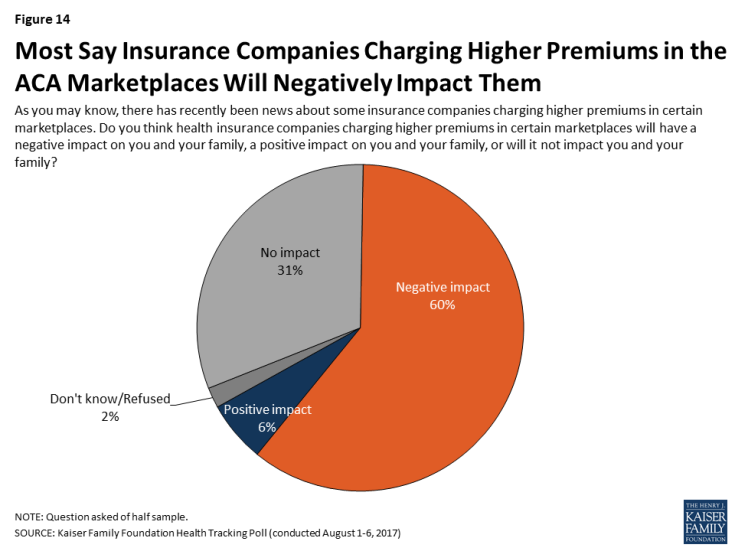
Figure 14: Most Say Insurance Companies Charging Higher Premiums in the ACA Marketplaces Will Negatively Impact Them
There has also been news about insurance companies no longer selling coverage in the individual insurance marketplaces and currently, it’s estimated that 17 counties (9,595 enrollees) are currently at risk to have no insurer on the ACA marketplaces in 2018.2 The majority of the public (54 percent) say health insurance companies choosing not to sell insurance plans in certain marketplaces will have no impact on them and their family. Yet, despite the limited number of counties that may not have an insurer in their marketplaces as well as this not affecting those with employer sponsored insurance where most people obtain health insurance, about four in ten (38 percent) of the public believe that health insurance companies choosing to not sell insurance plans in certain marketplaces will have a negative impact on them and their families.
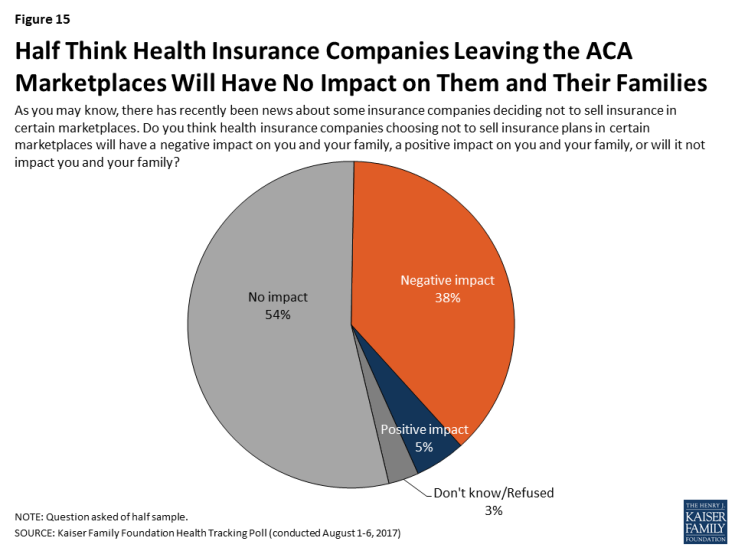
Figure 15: Half Think Health Insurance Companies Leaving the ACA Marketplaces Will Have No Impact on Them and Their Families
The majority of the public think both of these ACA marketplace issues will affect everyone who has health insurance and not just those who purchase their insurance on these marketplaces. Six in ten think health insurance companies choosing not to sell insurance plans in certain marketplaces will affect everyone who has health insurance while about one-fourth (26 percent) correctly say it only affects those who buy health insurance on their own. In addition, three-fourths (76 percent) of the public say that health insurance companies charging higher premiums in certain marketplaces will affect everyone who has health insurance while fewer (17 percent) correctly say it will affect only those who buy health insurance on their own.
Majority Say President Trump Should Not Use Cost-Sharing Reduction Payments as Negotiating Strategy
Over the past several months President Trump has threatened to stop the payments to insurance companies that help cover the cost of health insurance for lower-income Americans (known commonly as CSR payments), in order to get Democrats to start working with Republicans on an ACA replacement plan.3 The majority of Americans (63 percent) do not think President Trump should use negotiating tactics that could disrupt insurance markets and cause people who buy their own insurance to lose health coverage, while three in ten (31 percent) support President Trump using whatever tactics necessary to encourage Democrats to start negotiating. The majority of Republicans (58 percent) and President Trump supporters (59 percent) support negotiating tactics while most Democrats, independents, and those who disapprove of President Trump do not (81 percent, 65 percent, 81 percent).

